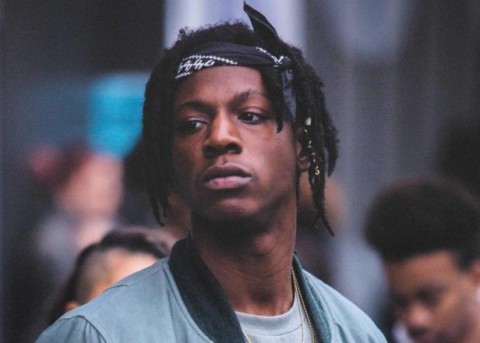Joey Bada$$ among the theological rappers
This kid from Brooklyn is storming the gates of heaven.

Folks are sleeping on Joey Bada$$. In the midst of a spiritual renaissance within hip-hop, Kendrick Lamar’s radical Christianity and Chance the Rapper’s black Christian joy have typically received more attention. They’ve both rekindled debates about asceticism, joy, and wrath. Yet, Joey Bada$$’s commentary in All-Amerikkkan Bada$$ should not be overlooked. It’s nothing less than a theologically rich, frontal attack on our political order.
I first found out about Joey through his song Paper Trail$. Not what one might initially expect, it’s a refreshing, vulnerable take on money and poverty. Joey’s framing here is so powerful that it impacted how I think about theological production. Horrid, oppressive theologies need to be subject to a materialist critique. In other words, if you want to understand the capitalism and white supremacy of evangelicalism, you must follow evangelicalism’s paper trails.
Upon listening to Joey’s All-Amerikkkan Bada$$, some see it as a direct attack on Donald Trump. It is. But it’s much more. Joey is critiquing the entire political order, including the neoliberal precedents to Trump. As he clarified in an interview, "Like, we had these problems with Obama. Stop thinking Donald Trump is the only problem. Like, he’s one of the many problems.”
For the purposes of this post, I want to highlight one song from his new album: Babylon. This song is explicitly Rastafari in its theology, featuring the familiar tropes of Babylon/Zion. Regardless if one agrees with Rasta tenets or with a turn to Ethiopia, some of the song’s theological insights can be helpful to people across various traditions.
The repeated line in the chorus, “I’m running away,” embodies a fugitive spirituality. Joey’s political theology is not one of integration into a burning edifice, it is a sharp repudiation of the system.
It’s worth sharing part of Joey’s 2nd verse in the song which contains some profound lyrics. I’ll paste this part below and then follow up with some brief commentary.
Joey Badas$$, “Babylon,” Verse 2
Detached from the roots since we set sail, my brothers
That's word to motherland, sold us on stolen land
Visions from brother man, he seen us all holdin' hands
Fifty years later, still see my brothers choked to death
R.I.P. to Eric Garner, only right I show respect
Nowaday they hangin' us by a different tree
Branches of the government, I can name all three
Judicial, legislative and executive
Lock your pops away, your moms, then next the kids
It's all consecutive, I'm just tryna break the cycle
I wonder if I'll do it all before they take my life, yo
Crucify my image, the Lord is my witness
If them Heaven's gates closed
I'ma break all them hinges for my niggas
Yes, I'ma break all the hinges for my niggas
Yes, I'ma break all the hinges for my niggas
Yes, I'ma break all
Joey Bada$$ foregrounds Eric Garner’s death with an acknowledgment of settler-colonialism (“sold us on stolen land”). Then, he quickly turns to link the history of lynching to present-day lynching in the form of American politics: “Nowaday they hangin' us by a different tree…Branches of the government, I can name all three…Judicial, legislative and executive.”
The tree reference already has me thinking about James Cone’s book The Cross and the Lynching Tree.
In one swift line, Joey indicts the racialized politics carried out by the three branches of our government. From the gutting of voting rights, to tax cuts for the wealthy, to changes on Marijuana policies, to Trump’s words and actions, it’s not hard to see through the thinly-veiled assaults on black people and people of color in the form of ordinary politics.
After contemplating whether his own image will be crucified after his death, Joey makes a sharp comment about heaven. “If them Heaven's gates closed…I'ma break all them hinges for my niggas.” He reaffirms and repeats the line: “Yes, I'ma break all the hinges for my niggas”
Joey exposes the ways in which the eschatological deck (i.e. constructions of heaven, of the good life, a good future) is stacked against him and those like him (“my niggas”). He declares that he will break the hinges of this closed door.
It’s inaccurate to think that Joey is only referring to the afterlife here. Instead, he is politicizing heaven and connecting it to the concrete struggles for survival on the ground.
Joey’s fugitive spirituality is encapsulated in the line, “If them Heaven's gates closed…I'ma break all them hinges for my niggas.” If Christian constructions of heaven (one can add: “shalom” and “common good”) have functioned so as to oppress black people and lock them out of life and opportunity, then these constructions need to be dismantled.
When Chance the Rapper declared, “I speak to God in public,” he captured an important moment in faith and hip-hop. Joey Bada$$ should be considered within this wave of theological rappers, making his own important mark. If “heaven” has been privatized, locking people out, then it’s time to change that.





